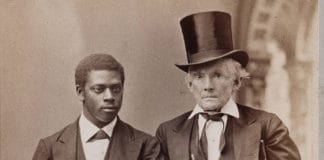Tags Confederacy
Tag: Confederacy
How did the slavery clause get into the 13th Amendment?
Lincoln was a proponent of the convict lease system and saw it as a restricted form of slavery that the state could exploit and the people would accept. He said as much clearly in his letter to Alexander H. Stephens just four months before the start of the Civil War. [Alexander Hamilton Stephens was vice president of the Confederacy during the Civil War, 1861-65.]
Resistance to the idea of reparations may be simply psychological
by Wade Nobles, PhD
The newly wide-ranging discussion of reparations is being
stimulated by the recognition of the 400th anniversary of the introduction of
kidnapped captive Africans...
‘The public peace’: Race, class, control and the creation of the...
On April 19, 2015, Freddie Gray of Baltimore, Maryland, was murdered by officers of the Baltimore Police Department while in their custody. An article published in The Atlantic three days after Gray’s death pointed out the historical precedent for this particular kind of state violence. The author wrote, “Black men dying at the hands of the police is of course nothing new.” The “peculiar institution” of this violent and racist system can be better understood by tracing the lineage of the police back in time.
10 things you should know about slavery and won’t learn at...
Much hullabaloo has been made recently about slavery as entertainment in movies like “Django Unchained.” But lost in the discussion is slavery as history. Though sadistic and macabre, the plain truth is that slavery was an unprecedented economic juggernaut whose impact is still lived by each of us daily. Here’s my top-10 list of things everyone should know about the economic roots of slavery.
White power to the rescue
The steady rise of ethnic nationalism over the past decade, the replacing of history with mendacious and sanitized versions of lost glory, is part of the moral decay that infects a dying culture. It is a frightening attempt, by those who are desperate and trapped, to escape through invented history their despair, impoverishment and hopelessness.
What we need is our 40 acres and a mule!
In 1910 there were over 1 million African-American farmers, and today there are fewer than 17,000. Now, an emerging movement is sweeping across urban areas to reclaim abandoned lots, under-serviced public parks and vacant lots to grow fresh food for the people.

 Store
Store






